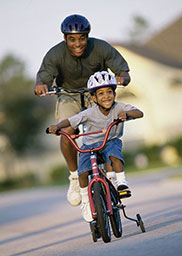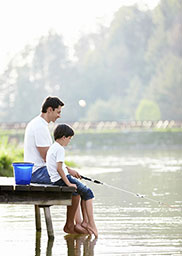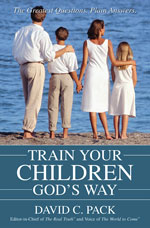 Thinkstock
Thinkstock
Article
While there are many possibilities available for proper childrearing, the most effective comes from the past.
Learn the why behind the headlines.
Subscribe to the Real Truth for FREE news and analysis.
Subscribe NowFirst there was relief. My wife had given birth to a healthy baby boy. When the doctors handed him to us, I remarked at the tiny features—the ears, the nose, the mouth. I was cuddling a newborn human being. It dawned on me that I was holding hope…clutching potential…embracing the future.
This may sound overly dramatic, yet these are the sorts of profound thoughts that go through a brand-new parent’s head. Seeing our infant son years ago, we questioned whether we could successfully shape another human being.
Raising children—we have two sons now—has given us the chance to impart our knowledge and experience into active young minds. There are the special moments of teaching them how to count and make their beds. Then there are the times you see their faces light up with satisfaction when they finally learn to tie a shoe or ride a bike without training wheels. Perhaps the most memorable and gratifying are the more challenging lessons they learn about sharing or making friends.
Any father or mother will tell you that parenting is filled with highs and lows that lead to a contrast of feelings and emotions. While there is pure joy when a child finally “gets it,” rarely will a parent’s patience be tested more than in making it happen.
No longer can my wife and I simply relax after a hard day of work and spend “me” time. Our children need this time instead. Hours are spent helping with homework, sharing meals, and answering questions. As parents, we become part-time counselors, doctors, maids and even referees! We must be willing to do what it takes to support our little ones.
Rearing my own children has helped me better understand a dichotomy that so often happens: “[Parenting] is, of course, kisses and hugs, laughter and sweet pronouncements,” one mother explained in a Guardian editorial. “It is tiny feet, little shoes, and a small sticky hand in yours. It is scrawly coloured pencil drawings, funny questions, tousled hair and the loveliness of a sleeping toddler…It is the beauty and wonder of children’s fascination with nature and all living creatures. It is all that and more.
“But it is also having your kid scream in your face in the supermarket for 20 minutes when you won’t buy them an ice cream…It is reading the same story 873 times…It is spending two hours making a meal for them, only for them to decide it is ‘disgusting!’ before tasting it and declining a single mouthful…It is the refusal to get dressed when you’re in a rush, to brush their teeth, to use crayons on paper only, and not on the floor and furniture…It is loving them so much that you feel constant fear: fear that they are going to run out into the road or fall out of a window, fear that you’re not a good enough mother…worry when they’re ill, sorrow when they’re unhappy, and protective fury when another bigger kid knocks them over in the playground.”
 Thinkstock
ThinkstockThis mother’s scenario demonstrates how hard raising children can be. And in an increasingly complex age, it is not getting any easier. Many are the times we could wish children came with an instruction manual!
While the concept of childrearing has been around as long as there have been children, the environment in which sons and daughters are reared has changed dramatically.
Consider that it has only been 100 years or so since the invention of automobiles, even less for airplanes and televisions—and mere decades for personal computers!
Childrearing methods have changed just as fast. An assortment of modern philosophies come with slick, new-age labels all promising to be the one that cracks the code to effective parenting. Contemporary concepts include attachment parenting, consensual living, continuum parenting, whole-life unschooling, and equally shared parenting, to name a few.
All are attempts to realize childrearing success. Yet so many new parenting approaches can leave one wondering what we did prior to our current age of “enlightenment.”
In general, most things develop and change for the better. Is modern childrearing any different?
Two Extremes
As a father, I have felt many times as though I have been in a no-win situation. On the one hand, I want to be there for my children. I want to ensure their success in school and protect them from negative influences such as bullying and drug abuse.
On the other hand, I also want them to learn from their mistakes and give them the freedom to develop the self-sufficiency needed to make it on their own.
I am not the only one who feels this way. This struggle by most parents has led to two styles of modern childrearing: fostering dependence vs. promoting independence. The two approaches are probably most recognized by the popular names “helicopter” parenting (fostering dependence) versus “free-range” parenting (promoting independence).
The two viewpoints form bookends to an array of parental approaches. Depending on their background and experience, most parents probably fall somewhere between the two—with most leaning more toward one.
Helicopter parenting, as the name implies, is a way of parenting in which a father or mother “hovers” over almost every aspect of their child’s life. The name is somewhat uncomplimentary, but parents who adhere to this approach defend the practice by saying they simply want to be part of their child’s life and protect them from harm.
 Thinkstock
Thinkstock
In a world filled with children who are routinely abandoned physically and emotionally, fathers and mothers who want to be more involved with their children seems justifiable. At its extreme, however, this form of parenting can be described as a series of “overs”: over-controlling, over-assisting, over-complimenting, over-protecting, over-scheduling, over-reacting and overestimating failure.
Domineering parents of young children tend to shadow them, constantly directing their behaviors and allowing them little alone time. As a child gets older, parents may look to select his or her teachers, sports coaches, friends and extracurricular activities, as well as provide excessive assistance with homework and school projects.
Parents who hover over their college-age children even go as far as picking their classes for them, contacting an instructor if they receive a bad grade, or attending job interviews with them. They often do not allow their children to do house chores or have part-time jobs, which stifles their work ethic.
While these fathers and mothers may have their child’s best interests in mind, they ultimately rear young adults who are ill-equipped to handle adversity, and have decreased confidence, underdeveloped life skills, increased anxiety, and a lack of decision-making abilities.
Such concerns have led to a giant swing in the other direction on the parenting spectrum toward what is known as free-range parenting. This is a more recent childrearing approach and is based on the belief that over-parenting has led to sheltered, spoiled children. Under this philosophy, parents allow their children to explore the world with minimal supervision and control. The thinking is that children should be allowed to grow and learn independence “organically” by experiencing life as it comes.
Interestingly, unlike the “helicopter” label, “free-range” has a somewhat positive connotation. The term typically refers to a natural, holistic approach to animal husbandry.
Free-range parenting is believed to be a way to help children build self-confidence and autonomy by allowing them to approach life as they eventually will after leaving the protection of their parents.
Yet opponents of this philosophy say it is not that simple, especially in modern times.
Tragic stories of missing and exploited children fuel some of the concern. In early 2015, a child-neglect case grabbed headlines as officials in Maryland investigated two parents who allowed their 10-year-old son and 6-year-old daughter to walk alone along a one-mile route from a local park to their home. The parents did so believing it to be important for their children’s overall development and to allow them to learn responsibility, experience the world, and gain competency.
Those in the community, however, including local officials, saw it as a failure by the parents to provide proper care and supervision. Under Maryland’s laws, children under age 8 must be watched by someone who is at least 13 years of age. Eventually, the parents had to sign an agreement confirming they would not leave their children unattended.
Free-range has also simply become a label used by lazy parents who lack the patience and commitment required for successful childrearing. What is called “teaching independence” is really just a form of “outsourcing” parental responsibility to television, mobile devices, or other non-parent options. Some parents also let their children make decisions because they do not know how to tell their children “no” or render proper discipline.
Both these parenting extremes, undoubtedly meant to address real problems, are fraught with negative consequences. Where does this leave parents who are truly seeking to protect their children while at the same time teach them the life skills necessary to succeed as adults?
Old Paths
Before the days of child development videos and computer programs, effective parents would not overwhelm their babies’ brains with stimuli. They would not force them to read as early as possible to gain a competitive edge on other kindergartners. The mother would spend sufficient time bonding with her children, with the father offering needed support.
As a child went off to school, parents would look forward to meeting his or her teacher, yet stop short of demanding that their child be taught a certain way. They would respectfully allow the teacher to instruct their child based on their experience, as well as the dynamic created by other students in the class.
In the past, children would be allowed to select their own activities or sports. At the same time, they were encouraged to try different ones to discover which they excelled at and to fully develop their fine-motor skills. They did not have to worry about choosing one sport at an early age with the goal of becoming a professional athlete.
Good parents did not routinely commandeer a child’s school project, putting it together themselves and adding the child’s name at the end. They would appropriately assist them with ideas and gathering needed supplies while also encouraging a child to do his or her best throughout the entire process.
 Thinkstock
Thinkstock
Children would routinely be permitted to walk alone or with friends to school as long as they followed the established route and arrived and returned at the proper time. At an appropriate age, they would also ride their bicycles in their communities without the watchful eye of their parents as long as they followed established rules. During the summer, children could go outside and play early in the morning and only come home for a meal or to occasionally check in.
Every waking moment of a child’s schedule was not filled with a structured activity or electronic device or medium. Children were also given unstructured time so they could think, imagine, create and explore their world.
As a result, they learned from their experiences, including occasional failures. They were allowed to become acquainted with disappointment, yet parents remained close enough to help a child avoid discouragement and depression.
There is a common thread in all these examples of traditional parenting—balance.
Yes, we do live in a more dangerous world where there are people out to harm others. But this should not become an excuse to imprison our children from experiencing the variety life has to offer. We must make a decision to do whatever it takes to account for the realities of our modern world—while also allowing our children to fully develop.
Many parents are starting to realize the benefits of avoiding the extremes in parenting. They are seeing the effects and realizing there must be a better way. Instead of adhering to the overbearing method of helicopter parenting or the looseness of the free-range approach, there is a middle road that reaps the benefits of both yet minimizes the disadvantages.
While no parent can walk the path perfectly, following it can lead to childrearing success.
Childrearing Book
When my wife and I began our family, our sources for childrearing instruction included personal experience and looking to others such as family and friends. Mostly, however, it was trial and error. We did not start out with a reliable source we could depend on for sound training.
As with so many other mothers and fathers, we were overwhelmed by the countless parenting books espousing philosophies and tips from every perspective. Many of these authors spent years developing their advice. Some of it was good, some of it misguided.
What would have been ideal would have been a book from an expert that could be relied on in its entirety because it contained no errors or missteps. While a natural reaction would be that a book such as this does not exist, we found that it does, and it follows the pattern of looking to the old paths for guidance and direction.
This Book is the Bible. Its author—God—is the foremost expert on raising children. He is the Being who created mankind and set the pattern for rearing children when He commanded the first married couple to “be fruitful and multiply” (Gen. 1:28). He knows what it takes for parents to raise sensible, balanced children, including in our modern times.
As the ultimate Parent overseeing billions of children, our Creator knows fully what our needs are and how to effectively meet them. The key is that we must believe and trust that this is the case and that He knows what He is doing.
Instructions on childrearing are found throughout the entire Bible, which is written “here a little, and there a little” (Isa. 28:10). Studying it from cover to cover reveals this.
Yet for the benefit of those seeking to learn more about the subject of parenting and hoping to avoid years of intense research or having to learn via the “school of hard knocks,” an extraordinary book based on clear biblical verses and principles has been written. It is a thorough guide to understanding what God has to say on the subject of childrearing.
Written by Real Truth Editor-in-Chief David C. Pack, this book is Train Your Children God’s Way. Thousands have benefited from the instructions contained within its pages, including my wife and me.
Even today, we are able to use the book as a reference when facing specific questions such as helping our children handle their emotions, teaching them the value of a strong work ethic, and choosing entertainment.
In the book, Mr. Pack, a father and grandfather himself, begins with a vivid description of what parents are up against today: “Take a moment to consider the world around you. Reflect on all the different kinds of influences—with seemingly more every day—to which a child is exposed. Rearing children in today’s violent, morally permissive, confusing, ‘anything goes’ world is perhaps the most trying, difficult thing that adults could do.
“The situation could be likened to a ship entering what has been called ‘the perfect storm.’ The force of the wind and the size of the waves beating on the ‘parental ships’ of today mean that parents are working seemingly against all odds, and without a compass, maps, a working rudder, or an engine to power their ship—assuming they even knew where to steer it. However, in reality, the greatest ‘perfect storm’ is that which their children are suffering. If it could be said that parents are experiencing 30-foot waves and gale force winds in the open ocean, at least they are on a ship. By analogy, their children are experiencing the same conditions, but in a small, leaking row boat, without oars or even a can with which to bail!”
He then goes on to demonstrate that the modern picture was foretold to occur in the pages of the Bible: “Here is a descriptive reference from the prophet Hosea foretelling the condition of today’s generation of young people: ‘They have dealt treacherously against the Lord: for they have begotten strange children…’ (5:7). This is more true than the older generation can even begin to comprehend.”
“Children today are cynical, emotionally drained and carrying a kind of world-weary mentality. While many may seem tough and talk tough on the outside, most are morally weak and spiritually vacant inside. They have become a generation of emotionally stunted children. As a result, they lack empathy—they cannot feel for others, and can only barely feel for themselves. They lack the moral fiber or backbone to do the right thing, even when it is painless. Millions have stumbled into adulthood believing that ‘if it feels right, do it.’”
 Thinkstock
Thinkstock
This graphic modern picture points more than ever to the need to go back to the old way of doing things, especially when it comes to raising children. Though it was not perfect during simpler times, people were more principled and well-rounded—and taught their children to be the same way.
The following quote from Mr. Pack shows how the present generation has erred by abandoning the “old paths”—God’s paths.
“God speaks to the citizens of this modern age: ‘Stand you in the ways, and see, and ask for the old paths, where is the good way, and walk therein, and you shall find rest for your souls’ (Jer. 6:16).
“The ‘old paths’ of true values and right traditions were to be taught within the family unit, the basic building block of any thriving society. If the traditional family institution crumbles, so does civilization.
“Millennials are reaching adulthood believing that any group of people can be defined as a family, so long as it exists on ‘love.’ God also states, ‘My people are destroyed for lack of knowledge’ (Hos. 4:6)—ignorance of the ‘old paths’ that lead to lasting success.
“In extreme cases, parents have pampered their children to the point of being rotten! What has been missing is balance: Parents have either babied their children or ignored them so that they essentially reared themselves.”
But the message in Mr. Pack’s book is not simply doom and gloom. Using Scripture, he gives real and practical points to help current and would-be parents face the challenges of raising children.
For my wife and me, the book has become the “instruction manual” we yearned for early in our parenthood. We can simply pull it from the shelf and pour through a veritable treasure trove of information whenever we need it.
Notice specific guidance in the text under a subhead titled, “Encourage Your Children to Respond and to Reflect Thoughts and Feelings”: “Young people in this generation have come to be jaded, cynical and perpetually moody. So many appear to be almost entirely joyless, bored and selfish. Observe a group of typical teenagers, and you will notice that most seem to wear expressionless, emotionless masks, hiding their true feelings. Instead of saying what they really feel, they generally say what adults want to hear. One of the tragedies of our time is that almost an entire generation literally does not know how to talk—how to intelligently express a thought. Of course, not all thoughts are simple. Many are quite complex and require intelligent analysis and a larger reservoir of words through which to convey them than exists in the vocabulary of the average young person today.
“Teach your children to be bright and enthusiastic—to respond to events around them. Do not allow them to be cynical or moody, or to develop and hold wrong attitudes. Make them change their mood and tone. This will lead to a habit of making themselves do this. The universal mantra of youth today is ‘I’m bored.’ What makes this so incredible is that never have children had so many kinds of things to occupy their time. This becomes its own great testimony to the fact that having everything has little to do with having happiness!”
This only begins to scratch the surface of the useful information in this book.
Make the Commitment
Children need guidance. They were made to receive instruction. Lessons can come from many sources, however, it is best when it comes from informed parents.
Decide today to do all you can to train your children. Recognize that despite the current environment, it is possible to raise a balanced, well-rounded young person. Understand that the process will not be easy. It will take a long-term commitment and a tremendous amount of hard work.
But also know that hard work is not enough. It also takes implementing the right information. Parents must put solid, proven methods into action. They must implement techniques shown by the ultimate Parent, God the Father, as being the most effective.
While raising a balanced and capable child in our modern age seems nearly impossible—it can be done. Order Mr. Pack’s free book on childrearing today at Train Your Children God’s Way. After you receive it, be sure to read, study and implement its instructions.
Seek the old paths! By doing so you can prove the following verse to be true: “Train up a child in the way he should go: and when he is old, he will not depart from it” (Prov. 22:6).



